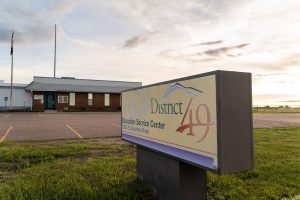Thomas Jefferson first coined the phrase ìseparation of church and stateî in reference to the Constitutionís First Amendment Establishment Clause. He stated that the Establishment Clause built a ìwall of separation of church and state.îThat phrase has become the nemesis of religious groups and the cornerstone of secular groups ó and the focus of heated arguments and court battles on just what it means.According to the Constitution, which was ratified on June 21, 1788, and the First Amendment, adopted in 1791, ìCongress shall make no law respecting an establishment of religion, or prohibiting the free exercise thereof.îThe Supreme Court has wrestled with hundreds of cases to clarify the clause; and, in 1971 (Lemon v. Kurtzman), the Court identified three factors that determine whether a government practice violates the Establishment Clause: ìFirst, the statute must have a secular legislative purpose; second, its principal or primary effect must be one that neither advances nor inhibits religion; finally, the statute must not foster an excessive entanglement with religion.î (The National Constitution Center)Many of the cases decided under the Establishment Clause have been about monetary aid to religious education or social welfare programs supported by religious organizations, and government-sponsored prayer.Public schools have been the focus of numerous complaints and conversations regarding both prayer in school and monetary aid like vouchers. Letís look at prayer in school.The Supreme Courtís best-known Establishment Clause decisions have determined that it is unconstitutional for public schools to lead schoolchildren in prayer or Bible reading, even on a voluntary basis (Engel v. Vitale 1962; Abington School District v. Schempp 1963). And the Court has not backed down throughout the years, extending prayer bans to include graduation ceremonies, (Lee v. Weisman 1992), and football games, (Santa Fe Independent School District v. Doe 2000).There are many watchdog organizations in this country that field complaints about potential violations of the Establishment Clause. The Freedom From Religion Foundation is an educational organization that promotes the ìconstitutional principle of separation of state and church.î The FFRF also educates the public on issues related to nontheism.The latest Pew Research Center survey of the religious composition of the United States shows that ìChristians continue to make up a majority of the U.S. populace, but their share of the adult population is 12 points lower in 2021 than it was in 2011. Currently, about three-in-10 U.S. adults (29%) are religious ìnonesî ó people who describe themselves as atheists, agnostics or ìnothing in particularî when asked about their religious identity.îIn March, the FFRF cited three school districts in El Paso County for violating the Establishment Clause. School District 11, District 20 and District 49 were the targets of complaints filed by their constituents.Seven complaints from people in D 49 were filed with the FFRF. The complaints singled out two board members ó Jamilynn DíAvola and Ivy Liu ó DíAvola for proselytizing a student with her religious beliefs; Liu for holding prayer meetings outside board meetings.On March 18, KRDO posted an email sent on district correspondence from DíAvola to a student. This is an excerpt: There is great freedom that comes from knowing the Lord Jesus Christ. He is the way, the truth, and the life Ö . It is for freedom that Christ has set us free, but with this freedom comes great responsibility. We are not free to do whatever we feel like, we must uphold the values and truth of the Bible.îKRDO interviewed Chris Line, an attorney with the FFRF. ìA board member using their position on the board to tell a student they need to believe in Jesus Christ, itís just completely inappropriate and not something a school board member should be doing,îIn mid-April, I also talked to Line for this editorial. The FFRF has fielded a multitude of complaints from all over the country regarding violations of the Establishment Clause in schools. Line told me that seven complaints from one school district is high. ìUsually, we have one to two complaints,î he said. To me, that means there are people in this district who donít want anyone promoting their religious beliefs in a school setting.When the complaint is against a staff member, Line said he can go to the principal or the board and ask that it stops. However, when itís a board member in violation, itís more difficult. ìThere is not much action they can take, other than recommending the person in question resigns,î Line said. ìItís an elected position so itís up to the community.îAt the April board meeting, Jamilynn DíAvola spoke for about 10 minutes and dismissed the FFRF complaint by quoting from the Christian book, ìAmericaís Godly Heritage.î The only problem is that the book has nothing to do with the Constitution. People can interpret anything in any way they want to argue for their own belief system. But we are talking the Constitution, and the Supreme Court is the higher power in cases for or against the Establishment Clause.I called DíAvola and Liu. They didnít reply. I just wanted to ask them one question: What if a Muslim, a Jewish person or an atheist tried to plug their beliefs on their kids in a school setting?The Supreme Court just heard a case April 25 about a public high school football coach who had been praying midfield after each game ended. The Bremerton High School officials in Bremerton, Washington, gave the coach instructions to stop because the gesture could be viewed as government approval of a certain religion. When he didnít follow through with the directive, he was suspended. Now, that coach is suing the school district stating that his right to practice his faith is being violated. If he wins, it could set a precedent allowing any and all faiths to converge on public school property for prayers.Whether we call it separation of church and state or the Establishment Clause, the forefathers must have believed that one religion favored over another could spawn countless wars and create wide divisions among humans. Well, thatís happened, and itís just what they wanted to avoid.






